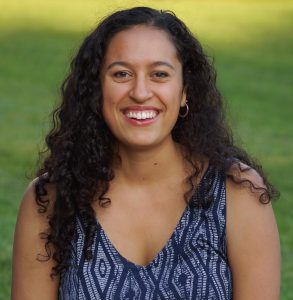Taylor ’21 Speaks to Choate Juniors on the Importance of Mindfulness
![Tyla headshot[1] copy](https://newsletter.blogs.wesleyan.edu/files/2019/10/Tyla-headshot1-copy-760x779.jpg)


By grounding oneself in the present moment, mindfulness can help create a free, calm, and content space without any judgment.
Tyla Taylor ’21, the mindfulness intern for Wesleyan’s Office of Religious and Spiritual Life, is working to share the practice of mindfulness with the campus community and beyond.
“Our minds are often going at full speed planning the next move, and the one after that,” Taylor said. “For me, mindfulness is paying attention to whatever is happening in the present moment, with compassion and non-judgment. From my own practice, I’ve seen how it’s made me a kinder friend, a more attentive student, and better able to handle situations that are thrown at me that are out of my control.”
On Oct. 15, Taylor was invited to Choate Rosemary Hall in Wallingford, Conn., to speak on a panel titled “A Mindfulness Meditation Approach to Managing Stress.” Taylor shared her experience and knowledge of mindfulness with more than 150 high school juniors.
“I brought up how mindfulness has helped me feel more engaged with whatever I’m doing in my life—my school work, spending time with friends, extracurriculars—and helps me navigate and feel like I have power and agency when something comes up in my life that makes me feel out of control,” she explained.
Having attended an independent college prep day school for her own high school education, Taylor hoped to connect with the students on a personal level. She spoke about the stressors students face on a daily basis.
“Mindfulness was a practice that I dabbled with in high school but didn’t take seriously until college, and I tried to let them know why it is important, and how I wish I had had this tool in high school as well,” she said. “For example, when you get a bad grade in high school, it’s easy to catastrophize and think, ‘This is so bad. I’m not smart. I’ll never get into that great college, etc.’ Mindfulness can help them detach from this thought that is creating a negative emotion, and understand how that unpleasant emotion isn’t who they are, but rather a temporary state that will pass.”
Taylor, who is majoring in psychology and minoring in education studies, also is a residential advisor for West College Residence Hall. As part of her mindfulness intern responsibilities, Taylor leads Mindful Wes, a group that meets weekly for mindfulness-based meditation sessions.
She also brings different speakers to campus and hosts events related to mindfulness. Last spring, Mindful Wes ran an “Unplugging Event” and challenged students to give up their phones for one day.
“My favorite testimony after the event was that one student reduced—and maintained afterward—her phone usage from eight hours a day to two hours a day,” Taylor said.
Additionally, as a volunteer component to the job, Taylor started an initiative at Middletown’s Farm Hill Elementary School, where she leads mindfulness exercises twice a week for two different classes. She recently taught a lesson on recognizing emotions. After that class, a fourth-grade student reported back to Taylor that when his sister had made him angry by taking his toy, instead of hitting her back like he usually would have, he took three mindful breaths and then walked away.
“It’s never too young for children to start mindfulness meditation,” she said. “It can help with their academic achievement, concentration, emotional control, and overall resilience towards stress.”
For more information, contact Mindful Wes.

